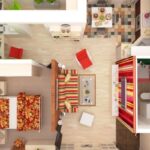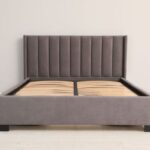When it comes to housing, everyone is on the lookout for options that are affordable, durable, and stylish. Enter manufactured homes! These homes have become increasingly popular as they offer a blend of affordability and modern design. Whether you’re new to the concept or thinking of purchasing one, this comprehensive guide will give you everything you need to know about manufactured homes, from their benefits to FAQs.
What are Manufactured Homes?
Manufactured homes, formerly known as mobile homes, are built in factories and transported to their final location. Unlike traditional homes, which are constructed on-site, these homes are assembled under controlled conditions, ensuring quality and consistency.
Once a manufactured home is delivered, it can be set up on a foundation, making it a permanent or semi-permanent fixture. Most people love the fact that these homes offer flexibility, affordability, and customization options—all without sacrificing quality.
Why Choose Manufactured Homes?
1. Affordability
Manufactured homes are often much cheaper than traditional stick-built homes. They can save you a bundle on construction costs because they are built in bulk and don’t require as much labor on-site. Plus, there’s less risk of delays due to weather, so the timeline—and budget—stays predictable.
2. Customization Options
Think manufactured homes all look the same? Think again! You can choose everything from the layout to the finishes, making your home unique. Want a larger kitchen or a spacious living room? No problem! Manufactured homes come with countless customization options that fit your style and needs.
3. Energy Efficiency
Another reason manufactured homes are gaining traction is their energy efficiency. Because they’re built to stricter standards than before, modern manufactured homes are designed with insulation, windows, and HVAC systems that help reduce energy consumption. That means lower utility bills in the long run!
4. Quick Construction Time
Waiting around for a house to be built can be frustrating, but not with manufactured homes! These homes are constructed in a factory setting, so they’re not affected by the weather or other delays that traditional homes face. This allows for a much quicker turnaround time—your home can be ready to move into in a matter of weeks!
5. Flexibility
Manufactured homes can be placed on leased land, rural areas, or even in designated home communities. This flexibility makes them ideal for people who move frequently or who want a home without the commitment of owning the land.
The Evolution of Manufactured Homes
In the past, the term “mobile home” carried a negative connotation—think small, cookie-cutter designs. However, the manufactured homes of today are a far cry from those stereotypes. They now feature modern designs, upscale materials, and all the amenities of a traditional house. You can get everything from granite countertops to hardwood floors, and you can customize the exterior to match your taste.
The HUD (U.S. Department of Housing and Urban Development) has also stepped in with strict regulations for the construction of these homes, ensuring they meet safety, durability, and quality standards. This means that today’s manufactured homes are built to last.
Manufactured Homes vs. Modular Homes
It’s easy to confuse manufactured homes with modular homes, but they’re different. Both are built in a factory, but while manufactured homes are built according to HUD standards, modular homes must follow local building codes.
Manufactured homes are transported on a steel chassis, which allows them to be relocated if necessary. Modular homes, on the other hand, are assembled on-site and become a permanent part of the property, like a traditional house.
Pros and Cons of Manufactured Homes
Every housing option comes with its pros and cons, and manufactured homes are no exception. Let’s break it down:
Pros:
- Cost-effective: One of the most affordable homeownership options.
- Customizable: You can personalize both interior and exterior elements.
- Energy-efficient: Designed with energy savings in mind.
- Quick construction: Faster to build compared to site-built homes.
Cons:
- Resale value: Manufactured homes may depreciate over time, unlike traditional homes.
- Land ownership: You may need to lease land, which adds to the long-term costs.
- Financing: Securing a mortgage for a manufactured home can be trickier.
Financing Manufactured Homes
One of the most common questions about manufactured homes is, “Can I get a mortgage for one?” The short answer is yes, but it might be a bit more complicated than getting a mortgage for a traditional home.
Since manufactured homes are considered personal property (like cars) rather than real estate, you may need to apply for a chattel loan, which typically has higher interest rates. However, if the home is placed on a permanent foundation, you might be eligible for a traditional mortgage.
Manufactured Homes FAQs
- How long do manufactured homes last?
With proper maintenance, manufactured homes can last as long as traditional homes—around 30 to 55 years. Some newer models may even last longer due to improved building standards. - Can I customize a manufactured home?
Absolutely! From the layout to the finishes, you can tailor a manufactured home to suit your personal style and needs. Just like traditional homes, you can choose everything from flooring to cabinetry. - Are manufactured homes energy-efficient?
Yes! Many modern manufactured homes are built with energy efficiency in mind, offering savings on heating, cooling, and electricity. This makes them a great option for environmentally-conscious homeowners. - Can I move a manufactured home after it’s set up?
While they’re designed to be mobile, relocating a manufactured home can be quite expensive and complicated. It’s best to consider it a permanent home once it’s set up. - Do manufactured homes come with warranties?
Yes, most manufacturers offer warranties that cover certain aspects of the home, such as structural integrity, appliances, and other components.
Conclusion: Manufactured Homes – A Smart Investment for Modern Living
If you’re looking for an affordable, customizable, and energy-efficient housing solution, manufactured homes might just be the answer. With so many benefits, including lower costs, quick construction, and the flexibility to move, it’s no wonder more people are turning to this housing option. While they come with a few challenges—like financing and potential resale issues—the pros far outweigh the cons for most buyers.
Considering a manufactured home? With modern designs, smart features, and strict building standards, manufactured homes offer a viable alternative to traditional housing. It’s a perfect way to get the home you want without breaking the bank.







